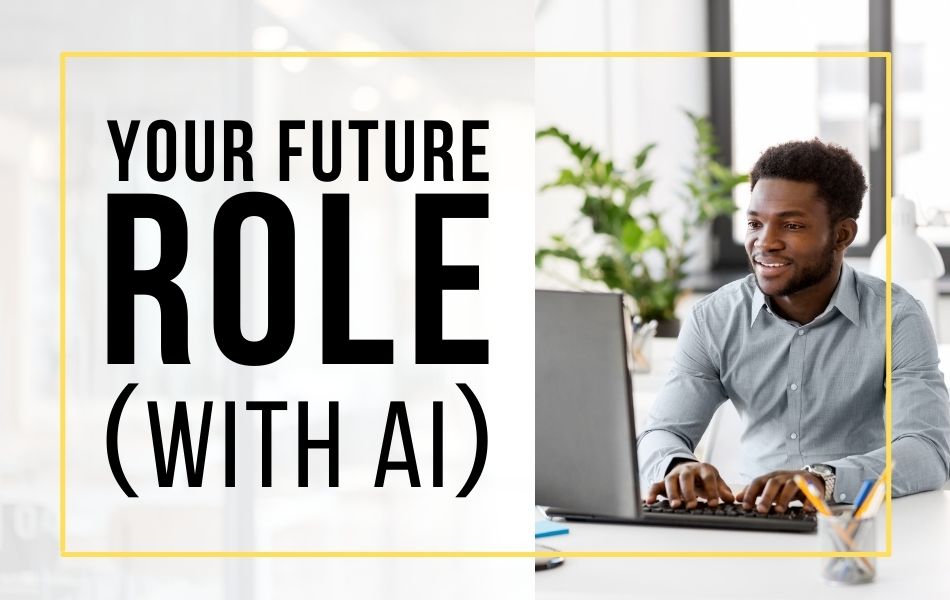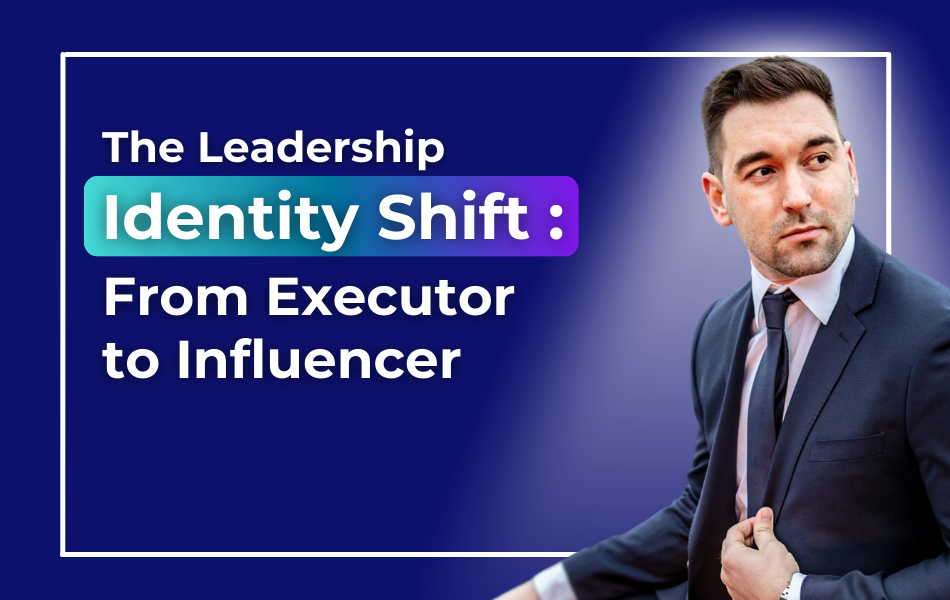
210. Your Future Role (With AI)
About this Podcast
Ep. 210 – Ever wondered how technology, like artificial intelligence (AI), might be changing the role of managers? It’s an interesting thought experiment but it’s not that far-fetched.
In this episode of The Manager Track podcast, we’re diving into that very topic. We’ll explore how AI is shaking things up in the workplace and what it means for you as a leader.
Here’s the thing: As AI gets smarter, it will start to play a bigger role in how you lead your team. It’s not just about managing people anymore; it’s about understanding how to leverage technology to make better decisions and drive better results.
If you’ve been thinking about how to incorporate AI into your role as a leader, you don’t want to miss this episode.
Episode 210 Transcript:
0:00:00 Ramona Shaw: This is episode 210, and we’re going to talk about your role as a leader as more and more AI technology is being introduced into the workplace.
0:00:15 Ramona Shaw: Here’s the how do you successfully transition into your first official leadership role? Build the confidence and competence to lead your team successfully and establish yourself as a respected and trusted leader across the organization? That’s the question, and this show provides the answers. Welcome to The Manager Track podcast. I’m your host, Ramona Shaw, and I’m on a mission to create workplaces where work is not seen as a source of stress and dread, but as a source of contribution, connection, and fulfillment.
0:00:43 Ramona Shaw: And this transition starts with developing a new generation of leaders who know how to lead so everyone wins and grows. In the show, you learn how to think, communicate, and act. Ask the confident and competent leader you know.
0:00:57 Ramona Shaw: You can be welcome to this episode of the Manager Truck podcast. Those of you who listen frequently, they know that every once in a while I sprinkle in an episode talking about AI or generative AI just to keep that topic going, because I’m such a strong believer that as leaders of the future, there’s really no way around but to educate yourself, to familiarize yourself with the tools and the technology in itself so you can fluently speak about AI integration, the technology, the risks, as well as the opportunities in your organization and your team specifically.
0:01:34 Ramona Shaw: Now, in this episode, I wa want toa talk about how your role as a leader may change in the future. And I decided to talk more about this topic on the podcast after I had a conversation with my colleague, Jessica Miller Morale. She is the founder and CEO of Vargy, a training and education platform for HR professionals. In that conversation, we talk about the intersection of HR and AI and how many of the tools related to employee management are not just for HR teams, but really aim to support the managers of teams in their function as people leaders.
0:02:19 Ramona Shaw: So that’s what I want to talk about in this episode and just dive into this a little bit more, mostly to inspire your own thinking about what that may look like for you. Because the last thing we’re shooting for here is to be caught off guard, caught by surprise, and not know how to address this question or feel like you missed the bus on some of the decisions or initiatives. Just like a sailboat that is out on the ocean and has to adjust its sails according to the wind, this is one of those winds, or maybe more so, a bit of a storm that’s coming our way and we have to adjust the sails before we’re in the midst of the storm in order to navigate our teams through this as good as possible.
0:03:00 Ramona Shaw: So let’s dive into this. There are many aspects of a leader, a people leaders’jobop, in terms of their people leadership that can be amplified with AI. That starts from the interview process or it actually starts earlier on in the selection of resumes, which means there are now many ways that people leadership responsibilities. So the things that you do to manage your direct reports and your team can be amplified by AI.
0:03:32 Ramona Shaw: And it really will impact the entire life cycle of an employee from interviewing all the way to offboarding. And in fact it starts early on which tools that will be introduced to help you get through the noise and the amount of resumes that might now becoming your way or your recruiting team’way for a position that you open up. AI tools will help you identify better suited candidates based on the role.
0:04:02 Ramona Shaw: What that also means is that when we’re now thinking about putting out shop descriptions for the open rules that we have on teams, where in the past, if you put something generic on that shop description, you will get very generic results back. So with AI tools, and as you might have experienced already using CHATgpt or Claude or Gemini or a tool like Copilot, that if you are vague in your prompt, you’re going to get pretty generic stuff back.
0:04:36 Ramona Shaw: And sadly, that’s where a lot of people just stop or think. Actually, never mind, don’t use those tools. It’s way too generic. You can tell from miles away that someone just copy pasted that out of Chattptd. That is not helpful. But the more specific that you get with your prompt, the better the outcome. The same is true for matching a job description with candidates is the more specific and the more precise the language that you use in the chop description is, the better the matches that you’ll get back from those AI tools.
0:05:15 Ramona Shaw: So it’s beyond just machine learning, it’s beyond just simple algorithms that mainly look at keywords or subject lines. It’s now going way deeper, which means you have to be really clear on what kind of person you’re looking for in terms of tasks, skills, expertise, personality, strength, values, and the list goes on. So then in the hiring process, role may be less about assessing someone’s competence or skill, and a lot more about building that personal relationship and the report and adding the human touch that an AI botht or assessments that will be created, and an AI can run those assessment and evaluate competencies and behaviors quite well. And I would say we’ll get to a place where where can do this hopefully a lot less biased, more systematic, more structured and fair throughout the entire hiring process.
0:06:17 Ramona Shaw: But what we can never replace is really that human aspect. So the ability to build relationships, to also demonstrate your own leadership principles and values and how you’re going to help the candidates succeed in this role and overall in their career, those aspects will become more important for the leader, that is for you then. Now let’s assume you did find someone, you made an offer, you get them into the organization and it’s day one.
0:06:46 Ramona Shaw: While it’s in the past, your role might have been to train them for the first couple of weeks and let them shadow other people, and you might have a three to six month learning curve. Currently, in most cases, there’s a lot of human to human interaction that’s involved with it. A lot of ways that your team members are, you yourself are investing time in training new employees with AI tools. This may become more automated because a lot of the things that you’re teaching could be recorded, could be captured, could be made available and summarized, and training modules can be created within minutes.
0:07:30 Ramona Shaw: So you have to do it once or a team member has to do it once. And a lot of that might get automated easier than it has, easier than you were able to in the past. It’s not like you weren’t able to automate or record yourself doing a training module in the past, but it is going to get easier and faster. So you might find yourself needing to leverage those tools more for training purposes. The onboarding component for your team members, and again, what you as a leader and your team will at is the human component.
0:08:07 Ramona Shaw: And in fact, a study that was done in 2021 from Georgia State University revealed that the more automation is introduced in the workplace, the worse the employee health and job satisfaction becomes. And that is really important to keep in mind. We are social creatures and when we onboard people, theres a really big social component to this that we need to keep in mind. And it’s not just about the tasks.
0:08:34 Ramona Shaw: And especially if that person is in a remote office location without team members there, or if that person is actually working from home, that then reduces even more some of the social aspects. So as a leader, I think many of us will have to figure out what that right balance is between automating, leveraging the tools, while also continue to lean into, maybe even expand on the social components and the relationship. So okay, going back to the lifec cycle, we talked about selecting candidates, the hiring process, now the onboarding process, now it goes into goal setting, feedback, performance, coaching, and helping your team get better and be successful. A lot of that currently is sort of in the hands of the manager. Let’s say that’s you.
0:09:24 Ramona Shaw: And sometimes if you’re a good manager, which if you’re listening to this podcast, I’m pretty sure you’re doing a good job or you’re learning, you become better, because clearly this is an interest to you and it’s important to you. But let’s face it, the reality is that there are a lot of managers out there who are heavily biased, who discriminate, who don’t know how to give feedback effectively, who might be absent or overly involved, but do things that aren’t effective to create a high performing environment.
0:09:54 Ramona Shaw: And so what will likely happen with the introduction of more AI tools that affect people leaders is that HR teams and managers will get deeper insights into how their team is doing. Right now, this is fairly common in sales orgs where sales conversations are being recorded. AI will give it some rating in terms of how much the salesperson, the sales rep talk versus how much did the prospect talk. They do a sentiment analysis to see what was the mood like during that call.
0:10:29 Ramona Shaw: They will pick up words, and oftentimes companies urge people to use certain sentences or specific words that they want to call out. So these tools make it easier to assess the performance of employees based on a set of criteria that the company defines. But now with more AI tools involved in the process, we can expand that into many more areas. It may be about to whom in a company you send emails, what is the sentiment of your emails? What’s the tonal of your emails?
0:11:03 Ramona Shaw: It may be able to predict interpersonal tension just by analyzing the written communication. It may be able to predict who are the informal authorities in organizations based on the relationships that through digital communication can be identified. It may also help managers identify people who are starting to be disengaged, and so the manager can intervene based on that information. It may also allow us to better understand different personality types or styles of work or cognitive diversity that our team members have, and then get help working more effectively with people who function differently or think differently than we as a manager do.
0:11:50 Ramona Shaw: So there are a number of tools that can enrich the data points that a manager has in order to support their team members. And so what I think is a great opportunity here for managers is to embrace that this is going to happen and then really try to figure out what, and then when to embrace these developments. If your HR team is suggesting a pilot or this looking for people who raise their hands and say like, yeah, I would like to be part of the pilot program. Or yes, I’d be willing to share your processes so the HR team can learn and can set up their systems in alignment with what they’re learning from the line managers.
0:12:30 Ramona Shaw: Raise your hand. Be an advocate and a supporter of the development. You might not like the specific tool, but the trend and the evolution of the technology and the changes are about to come. Those are inevitable. So lean into the development. Maybe not necessarily the specific tools, because there are going to be tools that are not useful and you obviously want to formulate your own opinions on it, but that will get you a front row seat.
0:12:57 Ramona Shaw: It will also showcase that you are one of the adapters of the technology and it will make your job easier down the road. In addition to positioning yourself in that direction. Or even if you listening to this I like I’ve never heard of my company doing anything like that. Maybe go inquire, ask hey, what are some of the tools you’re looking at that were some of the strategies you’re thinking about? If I can help in any way, I’d be interested to participate. I’d be interested to test some things to run some pilots.
0:13:29 Ramona Shaw: Let me know. I’d be definitely willing to help. Now, in addition to that, I also encourage you to think about what kind of data points or information would help you practically identify risks or challenges, and then with that, be able to support your team in a more effective way. For sales team, again, that’s usually pretty straightforward, although sales teams and companies are getting more and more creative on how to do it as well.
0:13:54 Ramona Shaw: But for everyone else, half this in the back of your mind as you’re talking to your team, because sooner or later there’s a high chance that you will be exposed to this. Now let’s talk about the things that AI is not going to do or not anytime in a foreseeable future. Those are strategy planning, real time assessments, and decisions. Now, of course, even with decisions, I could use chatgpt and say, hey, this is what we’re deciding on.
0:14:24 Ramona Shaw: Attach some kind of document and say, be a challenger. Challenge me on this decision that I’m intending to make. What are the risks? What are the challenges? What objections will come my way? And that may help you make better decisions or communicate your decisions more effectively. Similarly, with strategies, you can say, hey, this is my goal, or this is the OKR that the company said, what are some strategies I should think about or consider in order to achieve this goal?
0:14:54 Ramona Shaw: Sure, those things help, but at the end of the day, these tools dont create novel ideas and they make decisions based on the information that you provide. But there’s simply a lot more complexity to decisions than the prompt that you put into a chat box. Right? There’s the human side, there’s the cultural side, there’s the nuances to decision making that a chat GPT simply won’t know about. Those will really be the areas in which, over the next five years or so, leaders will provide unique value in organizations.
0:15:28 Ramona Shaw: So with that in mind, it would mean for you. Yeah, think it would mean for you to think about your decision making frameworks. What are the factors that you consider? How do you make decisions? Who owns switch decisions? There’s a lot of things that you can learn to make, a lot of tools and strategies that will help you become better at decision making. We’ll talk about this, by the way, in our leadership advisory program for advancing leaders, which you can find on the archova website, and we’ll link to it in the show notes.
0:16:00 Ramona Shaw: Now, the same with strategic planning. To plan well and to think strategically, you need to connect the dots between projects, plans and people. And so building a strong network inside the organization or in your industry, asking good questions for you to understand what is going on, what are some emerging trends, what are some concerns, what are other departments doing on the strategic front, those things will become really important and unique value adds of leaders, and hence the importance for leaning into it and embracing that as a leadership responsibility.
0:16:39 Ramona Shaw: Now, I wanna highlight one more part, and this goes back to the study that I mentioned earlier from Georgia State University, that there is a unique dynamic that’s going to form between humans and AI. And it will take emotional intelligence, it will take strong communication skills of leaders to help their teams lean into, embrace and adapt to new technologies. But then also again, find that rightme balance between what are the human aspects that we need to continuously cultivate, and then where is automation and where is AI going to be very useful and how, and when are we going to engage with it.
0:17:21 Ramona Shaw: So if you summarize this, a lot of the menial tasks or the day to day responsibilities of people, leadership can be amplified with AI. And I think that’s a good thing. Yes. I’m not talking about data privacy and what it actually will look like to integrate it simply from a benefit cost analysis. And what that allows you as a leader to do is to lean further, lean into your strategic skills, decision making, innovation, vision, relationship building, communication with your team, managing change.
0:17:58 Ramona Shaw: And those are things that may sound complicated. And for some of you, this might be really exciting. And you say, yes, I’m fully ready, I can’t wait, and I already love and do really well in those areas. And then some of you may not feel as comfortable in these particular areas of leadership yet as you are re still fairly involved in a day to day work of people leadership. So if you’re in that later camp, my recommendation really is to expose yourself to training in opportunities and again, conversations to practice these skills and navigate and see your future path in that direction.
0:18:37 Ramona Shaw: Now to wrap up, the last thing I want I emphasize is becoming AI savvy. There’s really no way around it. And it’s not just knowing how to use chat. CPTT really just scratches the top of the surface. It’s about understanding how the technology works so that you can fluently talk about risks and potential biases, data sources, technological implications, data privacy, and so forth. So understand the models, understand the costs of the models.
0:19:07 Ramona Shaw: Experiment with different tools that are already out in the market. Again, keep your eyes open. Scan your landscape for opportunities or for risks. Have conversations with your team members about it. Start to build a repertoire, a library of ideas or of prompts that are useful, or of tools that are useful to you and your team. Develop your AI principles and share them with the team. Or if your company has AI principles, make sure that you reinforce them and keep them at the forefront with your team.
0:19:38 Ramona Shaw: At Arcoa, we do have a training program that’s helping leaders become AI fluent. Hence it’s called AI fluency for leaders. And we’re not talking about the Jacptt prompts and prompt engineering in that program. It’s also not intended for technical leaders. It is intended for non technical leaders who know they need to become more AI savvy and need to get those fundamentals down and understand how to assess this technology, how to integrate into their work, and how to continuously iterate or experiment with it in the future.
0:20:14 Ramona Shaw: We’ll put the link to the program in the show notes and that is a wrugk for this week’s episode. I do hope that inspired your own thoughts and reflections on how your role as a people leader might change so you can prepare for it. Thanks so much. We’ll see you again next week. Ciao for now.
0:20:31 Ramona Shaw: If you enjoyed this episode, then check out two other awesome resources to help you become a leader people love to work with. This includes my best selling book, the confident, incom competent new manager, which you can find on Amazon or ramonashaw.com book, and a free training on how to successfully lead as a new manager. Check it out@ramonashaw.com. Masterclass these resources in a couple more you’l find in the show notes down below.
REFLECTION & DISCUSSION QUESTIONS
- In what ways do you think AI technology could augment or automate aspects of your role as a leader (e.g. hiring, onboarding, training, coaching)? What feels exciting or concerning about this potential?
- As a manager, how can you model embracing change while being attuned to team needs?
- If you wanted to become more “AI savvy”, what are some specific steps you could take to understand AI tools, models, and implications more deeply?
RESOURCES MENTIONED
- Learn More about the Leadership Advisory Program here https://archova.org/leadership-advisory/
- Learn More about the AI-Fluency for Leaders Program here https://archova.org/ai-for-leaders/
- Learn how to turn your 1-on-1 meetings from time wasters, awkward moments, status updates, or non-existent into your most important and valuable meeting with your directs all week. Access the course and resources here: ramonashaw.com/11
- Have a question or topic you’d like Ramona to address on a future episode? Fill out this form to submit it for her review: https://ramonashaw.com/ama
OTHER EPISODES YOU MIGHT LIKE
- Episode 179: Developing AI-Enabled Leaders: A Panel Discussion
- Episode 193: AI: 2024’s Most Important Leadership Topic
- Episode 198: 6 Essential AI Skills for Leaders & 5 Must-Take Actions
- Episode 205: Elevating Communication with GenAI
WHAT’S NEXT?
Learn more about our leadership development programs, coaching, and workshops at archova.org.
Grab your copy of Ramona’s best-selling book ‘The Confident & Competent New Manager: How to Rapidly Rise to Success in Your First Leadership Role’: amzn.to/3TuOdcP
If this episode inspired you in some way, take a screenshot of you listening on your device and post it to your Instagram Stories, and tag me @ramona.shaw.leadership or DM me on LinkedIn at linkedin.com/in/ramona-shaw
Are you in your first manager role and don’t want to mess it up? Watch our FREE Masterclass and discover the 4 shifts to become a leader people love to work for: www.archova.org/masterclass
Don’t forget to invest time each week to increase your self-awareness, celebrate your wins, and learn from your mistakes. Your career grows only to the extent that you grow. Grab your Career Journal with leadership exercises and weekly reflections here: ramonashaw.com/shop
Love the podcast and haven’t left a review yet? All you have to do is go to ramonashaw.com/itunes and give your honest review. Thanks for your support of this show!
* Disclaimer: Shownotes may contain affiliate links. That means that I am awarded a small commission for purchases made through them, at no added cost to you.







